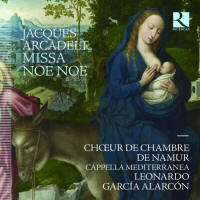Texte paru dans: / Appeared in: |
|
|
Outil de traduction |
|
|
As it happens, the Missa Noe Noe has also been recorded previously by the alltoo-short-lived Henry’s Eight (Etcetera, 10/99). Here, too, comparison is invidious; on the one hand, a two-to-a-part all-male ensemble, and on the other, a mixed choir with instruments doubling each part. The English group get off to a flying start but seem to lose their way during the Credo, and in the latter movements the tempos are a little too staid for comfort. Under Leonardo García Alarcón’s direction, the Belgian musicians sensibly keep to more even tempos, and the transparency of Arcadelt’s four-voice texture suits their light sound very well. The individual voices may not be as compelling as those of Henry’s Eight but the instrumentalists of Cappella Mediterranea bind the voices admirably and shine on their own (in Mouton’s motet). To my ear, their presence adds an extra dimension.
Elsewhere it must be said that results are less positive, largely because of directorial decisions: first, the persistent tierces de Picardie at the conclusion of Josquin’s ‘Illibata’, which had got off to a promising start and instead loses momentum; second, consistently over-egged ritardandos – increasingly distracting, not to say irritating; and finally, a bafflingly slow tempo chosen for Josquin’s Benedicta es, here performed with Jean Guyot de Chatelet’s six added voices. The doubling of the texture automatically makes things heavier; all the more reason, one would think, to keep things moving, instead of which the recital ends on a disappointedly ponderous note, far from the rollicking fireworks that might have been. |
|




